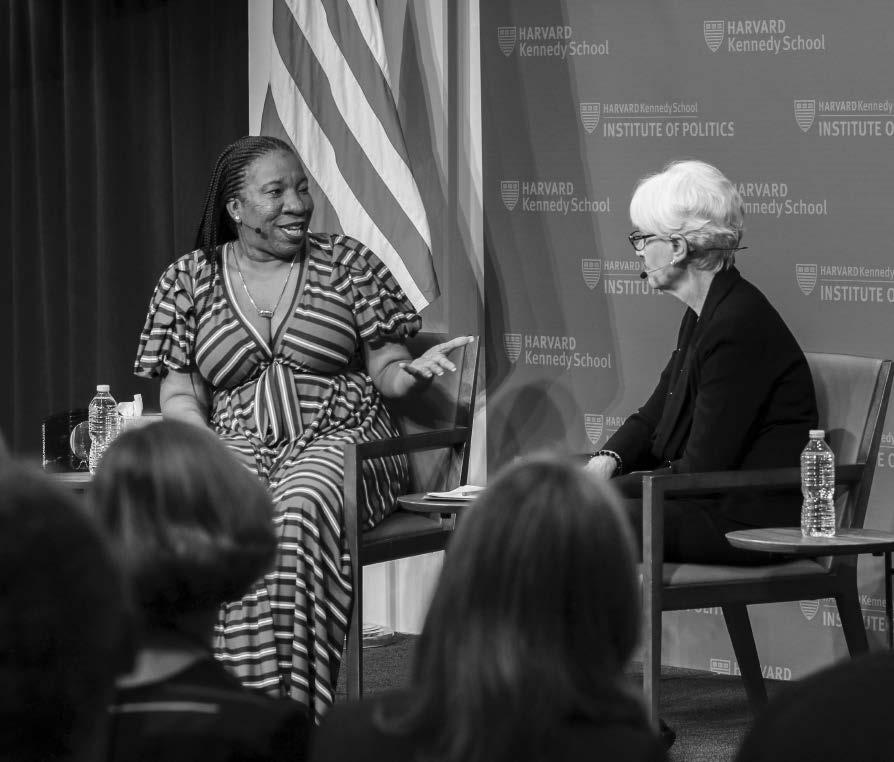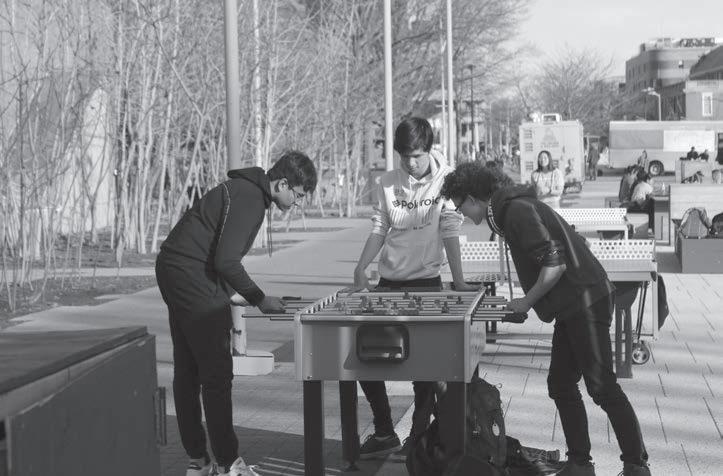THE HARVARD CRIMSON | FEBRUARY 27, 2020
Page 6
Editorial The Crimson Editorial board
column
Baron’s Selection Highlights the Necessity — and the Challenges — of Good Journalism
Life, Liberty, and Basic Income
L
ast week, Harvard announced that Martin “Marty” Baron, current executive editor of the Washington Post and the former executive editor of the Boston Globe, will be the Class of 2020’s commencement speaker. Over his more than 40-year career, teams of reporters under Baron’s leadership have been awarded 16 Pulitzer Prizes and broken stories that shook up not just Boston and the United States, but the world at large. Baron ran the Globe when the paper’s “Spotlight” team unearthed a widespread practice of sexual abuse by priests across Roman Catholic communities in the Boston area. Also under Baron’s guidance, the Post uncovered and published the Afghanistan papers, exposing malpractice by U.S government officials as they conducted military operations in the Middle East. These journalistic feats speak to the impact of the free press, and to the power that in-depth investigative journalism can have on our lives. Further, they speak to Baron’s own unwavering commitment to speaking truth to power and doing so with care and respect. There is a strong case to be made for Baron’s work representing the best of what journalism ought to look like. At the same time, Baron’s journalism career, while overwhelmingly bright, has not been spotless. Just this January, Baron was at the center of a controversy over the Post’s decision to suspend a reporter who used her personal Twitter account
to retweet an article about the late Kobe Bryant’s 2003 sexual assault case on the day of the famed athlete’s passing. The decision, which was later reversed, has been criticized in the Post itself. This incident should serve to remind us all that, while the functions of a free press are indispensable, trying to embody journalistic excellence is a never-ending task, and that even the greats are continually test-
There is a strong case to be made for Baron’s work representing the best of what journalism ought to look like. ed (and occasionally fail) at this task. The production of good journalism requires constant humility, scrutiny, and ethical vigilance. Continuous striving for a more equitable, representative culture in journalism is a critical part of that task. Baron’s storied career serves to capture the struggles, triumphs, and ultimately the necessity of an industry currently under attack. Harvard’s selection of Baron as this year’s commencement speaker is an encouraging acknowledgment of the crucial role that journalism plays in any free society. The Globe’s investigation into the Catholic Church and release of the Afghanistan papers are just a few of
many instances where Baron, his newspapers, and the press have been able to check institutions of power and hold authorities accountable for their actions. Such work shifts our perceptions of the truth and enhances the richness with which we understand reality. We would be remiss not to praise it. We also appreciate the way in which Harvard’s choice of Baron pushes against our general idea of what an ideal commencement speaker is. Investigative journalism isn’t the ritziest business. While most Harvard students expect and might covet the selection of someone whose name is universally known, Harvard’s choice of Baron — a name arguably less recognizable than last year’s commencement speaker, Angela Merkel — elevates journalists and their work to an important level parallel to the star-studded list of past commencement speakers such as Bill Gates and Oprah Winfrey. We are excited to hear the perspective that Baron has to share with Harvard’s graduating class. This staff editorial solely represents the majority view of The Crimson Editorial Board. It is the product of discussions at regular Editorial Board meetings. In order to ensure the impartiality of our journalism, Crimson editors who choose to opine and vote at these meetings are not involved in the reporting of articles on similar topics.
—Carine M. Hajjar ’21, a Crimson Editorial editor, is a Government concentrator in Eliot House.
Matthew B. Gilbert ’21 is a Computer Science concentrator in Adams House. His column appears on alternate Thursdays.
@thecrimson Op-ed
The Trump Bucket: The Perils of Being Conservative at Harvard As a non-liberal student on Harvard’s campus, I’ve always had an instinct to stay quiet about my beliefs. I could never pin down why, though. Sure, there is the sheer fact that only 10.3 percent of students in the class of 2023 consider themselves to be somewhat conservative (while 2.1 percent call themselves very conservative). Overall, however, I’ve usually been able to override my instinct to remain subdued. Recently, I was able to pin down a reason. While talking to a peer about her work with a conservative woman on campus — a moderate, at that — I asked her if she was conservative herself. She looked as though I had uncovered her deepest secret. Her eyes bulged and she stuttered. My first impression was that she was nervous to admit her conservatism; however, after reflecting, I’m almost positive that her apprehension was due to the common association of conservatism with Trumpism at Harvard.
Liberal students must take steps to differentiate Trumpism from conservatism. The fear of being associated with Trump and the current Republican Party stifles conversations between liberal and conservative students while simultaneously delegitimizing conservative students’ beliefs. Going forward, both groups must take steps to create a productive, respectful dialogue. Moreover, liberals must correct their understanding of conservative views, and conservatives must overcome their fear of being labeled as supporters of a widely unpopular president among Harvard students. Liberal students must take steps to differentiate Trumpism from conservatism. While some conservative students do support the president, my bet is that most on this campus do not (though if
We have decided to structure our society such that most people have no choice but to sell their labor in order to survive. When a person’s life rests in the hands of their employer, they are not free.
sive, inclusive conversations on campus. For instance, I have made it a point to engage my liberal friends in more political conversations. This is always an anxiety-inducing experience at the beginning. In a short amount of time, however, the majority of my peers are surprised by the legitimacy of my opinions and my lack of maliciousness and ignorance.Going into the 2020 elections, it is now more imperative than ever that liberal students overcome their false associations by listening with an open mind and educating themselves about actual conservatism. At the same time, conservative students also have a job to do: Instead of fearing what others think of them, they must clearly articulate their beliefs in order to distinguish themselves from the false caricatures that have become the defaults in so many of their peers’ minds.
The Crimson
they do, their reasons for doing so may be surprising and acceptable to liberals upon open dialogue). Here is why: The president does not govern conservatively. The Trump administration has “hijacked” a traditionally conservative party and imposed on it a mix of populist assertions. As the GOP undergoes an identity crisis, a huge contingent of the party is finding itself politically displaced. There are a few key distinctions between today’s party and the current administration. Conservatism does not entail an overall rejection of change, but is a moderated and controlled attitude towards change that asserts that when the government tries to resolve one issue, it usually creates more. Yet while many conservatives celebrate free trade, little government involvement, and consequently less spending, this administration has pursued heightened protectionism and huge amounts of government spending and expansion. Of course, it is hard to define conservatives as a whole over space and time, but what I can say with confidence is that just ten years ago, the Trump platform would not have survived a Republican primary. With a better understanding of general conservative principles, liberal students may start to see conservatism as a distinct political philosophy and differentiate it from the surge of populism that they so harshly condemn. In the same vein, liberal students should also consider engaging Trump supporters in conversation to understand their standpoints — some of which will certainly be reasonable. In this way, they can leave the echo chambers that condemn and misconstrue the conservative ideology. Understanding leads to the type of dialogue that can heal the divides between ideologically opposed students on this campus. While liberal students need to educate themselves and open the dialogue to all views, conservatives need to step up and stand by their opinions. Only then can they destigmatize their beliefs on campus. Conservative students’ fear is understandable, however. The automatic as-
“W
e hold these truths to be self-evident, that all men are created equal, that they are endowed by their Creator with certain unalienable Rights, that among these are Life, Liberty and the pursuit of Happiness.” The Founding Fathers penned these words in the Declaration of Independence and laid forth a vision of what America could be. There is hope in these words — hope for a world in which all people have their basic needs met, have the freedom to make their own choices, and have the opportunity to pursue a meaningful life in their own way. We have not yet met this vision, but I believe that we have both the ability to achieve it and a moral obligation to do so. We need universal basic income in order to guarantee these rights to
all Americans. UBI advocate Scott Santens has noted that “Poverty is a legal status … Poverty is being legally excluded from having sufficient access to resources to exist.” The existence of poverty is an unnatural violation of people’s right to life. It should not exist and it does not have to. In the United States today there is enough food for people to eat and there are enough beds for people to sleep in. The issue is that basic needs like these cost money. Survival costs money. As a society, we have decided that those without money should not survive — but we can change that. We have a moral duty to change that. Not only do humans deserve, as a right, the basic necessities of survival, but furthermore, nobody has the right to come between a person and what they need to survive. A universal basic income can eliminate poverty entirely by giving people the ability to acquire their basic necessities and ensure the right to life for all Americans. But survival is not enough; someone in prison has their basic needs taken care of, but that life is not enviable. People also have a right to liberty, defined here as freedom from coercion. In other words, it is the ability to say no. The choice between work and starvation is not a choice at all. That is not freedom. We have decided to structure our society such that most people have no choice but to sell their labor in order to survive. When a person’s life rests in the hands of their employer, they are not free. While we have many protections for workers, we have not abolished this one-sided relationship and the unjust coercive power that comes with it. UBI liberates people from financial dependence on others in every kind of relationship: freedom from exploitative work, abusive partners, and more. Critics of UBI claim that it would reduce people’s desire to work, but that very criticism reveals that much opposition to UBI comes from those who stand to lose their coercive power over others. If someone would quit a job once their basic needs were met, they were only working that job to meet their basic needs — to survive. Therefore, they were coerced into the job by the threat of poverty and did not take the job by their own free will. UBI gives people the chance to be truly free. What will people do with their newfound freedom? Anything they want. Many people will keep their jobs; people often enjoy the structure, community, purpose, or extra income that comes with a job. Some, once they receive the financial security of UBI, will still work, but will quit their second or third job or limit their hours in order to do more of whatever they enjoy. Others will stop working entirely because those jobs are dangerous, exploitative, or otherwise unpleasant, as they should have the right to do. This reduction of work should be celebrated; our society can function perfectly well without much of the work that people are forced into today. Many people will then have more time to pursue the activities they find most meaningful. UBI recipients will spend more time with their kids and families. They will care for elderly and sick relatives. They will volunteer and start businesses. They will become artists and writers, journalists and students, dreamers and doers. We waste untold potential and systematically crush the human spirit because we force people into needless drudgery just to stay alive. We deny an integral part of the human experience by denying people the chance to create, to explore, and to pursue happiness. Critics have disparaged UBI as “free money” or a gimmick. What they fail to realize is that money is not the point of UBI. Money is a means to an end: freedom. Freedom from poverty, freedom from coercion, and freedom to strive for self-actualization. Basic income is not charity or welfare. It is a right. We have both the ability and the obligation to end poverty, ensure liberty, and give every American the chance to find their own version of success. We can finally live up to the ideals of the Declaration of Independence and secure these natural rights. There is no reason to wait. The time for universal basic income is now.
Submit an Op-Ed Today!
By Carine M. Hajjar
Matthew B. Gilbert A Time for New Ideas
sociation between President Trump and conservatism is not just deeply flawed, but it can even be dangerous for non-liberal students. The President is broadly perceived as an unintelligent, even malicious, individual in most circles on this campus. Take a moment and think about what your reaction would be if you were falsely accused of voting for President Trump and thus associated with those traits. Surely you would do everything in your power to dismiss the accusation. Perhaps you would avoid even bringing up topics that could lead to this conversation. But even if I, and other non-liberals, fear speaking up, we cannot afford to stay quiet if we hope to engage in comprehen-
Understanding leads to the type of dialogue that can heal the divides between ideologically opposed students on this campus.




